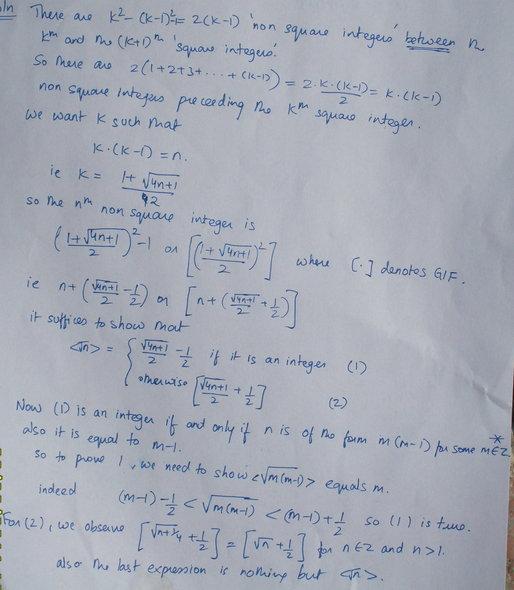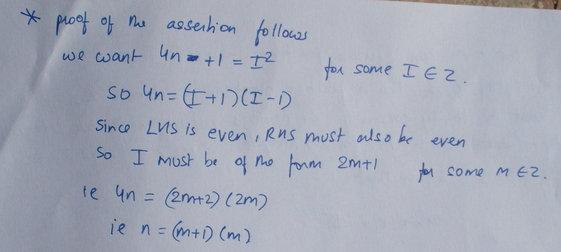 21
21Suppose P is any non square number
Its easy to see that X(p - [√p]) = P
All integers can be expressed as (p - [√p])
Let (p - [√p]) = n
so Xn = n + [√p] = n + <n>
As [√p] = <√ (p - [√p]) > hence proved
Proof of the property
[√p] = <√ (p - [√p]) >
As P is a non square number N2<P<(P+1)2
so [√p] = N
we have to prove <√ (p - [√p]) > = N
P can be written as N2 + K where 1≤K≤2N
so we have to prove <√(N2 + K - N)> = N
This is true because for N+1≤K≤2N we have N<√(N2 + K - N)<N + 0.5
and for 1≤K≤N-1 we have N- 0.5 <√(N2 + K - N)<N
for K = N its verified that <√(N2 + K - N)> = N
So proved
 341
341Or maybe we will present it in a such a posh manner it will look better :D.
First lets convert the <> to something we are familiar with.
note that
<x> = \left[x+\frac{1}{2} \right]
So, we look at the sequence
a_n = n +\left[\sqrt n+\frac{1}{2} \right]
Now let n=m^2+k; 0 \le k \le 2m
Its easy to prove that
m^2<m^2+m < \left(m+\frac{1}{2}\right)^2<m^2+m+1<(m+1)^2
That means
\left[\sqrt {m^2+k} + \frac{1}{2} \right] = m ; 0 \le k \le m^2+m
and
\left[\sqrt {m^2+k} + \frac{1}{2} \right] = m+1 ; m^2+m+1 \le k \le 2m
With this we easily see that the numbers
(m^2-m+1,m^2-m,..., m^2,...,m^2+m)
get mapped to
((m-1)^2+1,(m-1)^2+2,....,m^2+2m)-\left{m^2 \right}
Thus every natural number is obtained and the squares are missed
 341
341sorry, we seem to have started posting together
 21
21EDIT : As P is a non square number N2 <P < (N+1)2
instead of N2 <P < (P+1)2
<x> = [x + 0.5]
this was great ..
 1
1nice solution shubhodip and as alwayss prophet sir. my solution is also similar, posting it below.
also pls post the time it took you to think of the solution . 2hrs<me<2.5hrs



